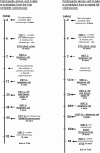A randomized controlled trial of eicosapentaenoic acid and/or aspirin for colorectal adenoma prevention during colonoscopic surveillance in the NHS Bowel Cancer Screening Programme (The seAFOod Polyp Prevention Trial): study protocol for a randomized controlled trial
- PMID: 23895505
- PMCID: PMC3733694
- DOI: 10.1186/1745-6215-14-237
A randomized controlled trial of eicosapentaenoic acid and/or aspirin for colorectal adenoma prevention during colonoscopic surveillance in the NHS Bowel Cancer Screening Programme (The seAFOod Polyp Prevention Trial): study protocol for a randomized controlled trial
Abstract
Background: The naturally-occurring omega (ω)-3 polyunsaturated fatty acid (PUFA) eicosapentaenoic acid (EPA) reduces colorectal adenoma (polyp) number and size in patients with familial adenomatous polyposis. The safety profile and potential cardiovascular benefits associated with ω-3 PUFAs make EPA a strong candidate for colorectal cancer (CRC) chemoprevention, alone or in combination with aspirin, which itself has recognized anti-CRC activity. Colorectal adenoma number and size are recognized as biomarkers of future CRC risk and are established as surrogate end-points in CRC chemoprevention trials.
Design: The seAFOod Polyp Prevention Trial is a randomized, double-blind, placebo-controlled, 2×2 factorial 'efficacy' study, which will determine whether EPA prevents colorectal adenomas, either alone or in combination with aspirin. Participants are 55-73 year-old patients, who have been identified as 'high risk' (detection of ≥5 small adenomas or ≥3 adenomas with at least one being ≥10 mm in diameter) at screening colonoscopy in the English Bowel Cancer Screening Programme (BCSP). Exclusion criteria include the need for more than one repeat endoscopy within the three-month BCSP screening period, malignant change in an adenoma, regular use of aspirin or non-aspirin non-steroidal anti-inflammatory drugs, regular use of fish oil supplements and concomitant warfarin or anti-platelet agent therapy. Patients are randomized to either EPA-free fatty acid 1 g twice daily or identical placebo AND aspirin 300 mg once daily or identical placebo, for approximately 12 months. The primary end-point is the number of participants with one or more adenomas detected at routine one-year BCSP surveillance colonoscopy. Secondary end-points include the number of adenomas (total and 'advanced') per patient, the location (left versus right colon) of colorectal adenomas and the number of participants re-classified as 'intermediate risk' for future surveillance. Exploratory end-points include levels of bioactive lipid mediators such as ω-3 PUFAs, resolvin E1 and PGE-M in plasma, urine, erythrocytes and rectal mucosa in order to gain insights into the mechanism(s) of action of EPA and aspirin, alone and in combination, as well as to discover predictive biomarkers of chemopreventive efficacy. The recruitment target is 904 patients.
Trial registration: Current Controlled Trials ISRCTN05926847.
Figures
References
-
- Atkin WS, Edwards R, Kralj-Hans I, Wooldrage K, Hart AR, Northover JMA, Parkin DM, Wardle J, Duffy SW, Cuzick J. UK Flexible Sigmoidoscopy Trial Investigators. Once-only flexible sigmoidoscopy screening in prevention of colorectal cancer: a multicentre randomised controlled trial. Lancet. 2010;375:1624–1633. doi: 10.1016/S0140-6736(10)60551-X. - DOI - PubMed
-
- Zauber AG, Winawer SJ, O’Brien MJ, Lansdorp-Vogelaar I, van Ballegooijen M, Hankey BF, Shi W, Bond JH, Schapiro M, Panish JF, Stewart ET, Waye JD. Colonoscopic polypectomy and long-term prevention of colorectal-cancer deaths. N Engl J Med. 2012;366:687–696. doi: 10.1056/NEJMoa1100370. - DOI - PMC - PubMed
Publication types
MeSH terms
Substances
Associated data
Grants and funding
LinkOut - more resources
Full Text Sources
Other Literature Sources
Medical
Research Materials


